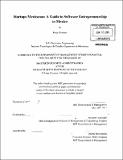| dc.contributor.advisor | Michael Cusumano. | en_US |
| dc.contributor.author | Guzmán, Jorge (Jorge Arturo) | en_US |
| dc.contributor.other | Sloan School of Management. | en_US |
| dc.coverage.spatial | n-mx--- | en_US |
| dc.date.accessioned | 2011-09-13T17:51:55Z | |
| dc.date.available | 2011-09-13T17:51:55Z | |
| dc.date.issued | 2011 | en_US |
| dc.identifier.uri | http://hdl.handle.net/1721.1/65781 | |
| dc.description | Thesis (M.B.A.)--Massachusetts Institute of Technology, Sloan School of Management, 2011. | en_US |
| dc.description | "May 20th 2011." Cataloged from PDF version of thesis. | en_US |
| dc.description | Includes bibliographical references (p. 61-64). | en_US |
| dc.description.abstract | This document investigates the possibilities of software entrepreneurship in developing economies, particularly Mexico, from an entrepreneur's perspective. It includes a broad analysis of the entrepreneurial environment in Mexico - venture capital, talent, regulation and market, in which it also touches on some topics that are relevant to the country today, like its growing violence trend. After creating a picture of the current environment in the first chapter, the second chapter investigates three different business models to create globally successful startups from Mexico. The first one of these models considers incubating a company in Mexico and then moving that company into the United States. The second one talks about ways in which Mexican companies can be created with the intention of selling software in the American market from their first day. Finally, the third one investigates going for the software market in emerging economies rather than the American market. The chapter closes with a proposed model to evaluate each opportunity, using as a base Michael Cusumano's eight point framework from his book The Business of Software. The third and final chapter presents three case examples of software business in Mexico that have had different levels of success, followed by some analysis. The businesses considered where two very successful ones, JackBe and Metroscubicos and one that had a lot of promise but could not materialize, Nibbo Studios. The document's conclusion contains two lists of ideas for entrepreneurs to keep in mind. One called "Seven myths and realities of Mexican software entrepreneurship" tries to paint the real picture of Mexico's entrepreneurial environment, and the second one, named "Eight principles for entrepreneurs creating a Mexican software startup" provides guidance for entrepreneurs creating new companies. | en_US |
| dc.description.statementofresponsibility | by Jorge Guzmán. | en_US |
| dc.format.extent | 64 p. | en_US |
| dc.language.iso | eng | en_US |
| dc.publisher | Massachusetts Institute of Technology | en_US |
| dc.rights | M.I.T. theses are protected by
copyright. They may be viewed from this source for any purpose, but
reproduction or distribution in any format is prohibited without written
permission. See provided URL for inquiries about permission. | en_US |
| dc.rights.uri | http://dspace.mit.edu/handle/1721.1/7582 | en_US |
| dc.subject | Sloan School of Management. | en_US |
| dc.title | Startups Mexicanas : a guide to software entrepreneurship in Mexico | en_US |
| dc.title.alternative | Startups Mexicanas : a practical guide to software entrepreneurship in Mexico | en_US |
| dc.type | Thesis | en_US |
| dc.description.degree | M.B.A. | en_US |
| dc.contributor.department | Sloan School of Management | |
| dc.identifier.oclc | 749518901 | en_US |
